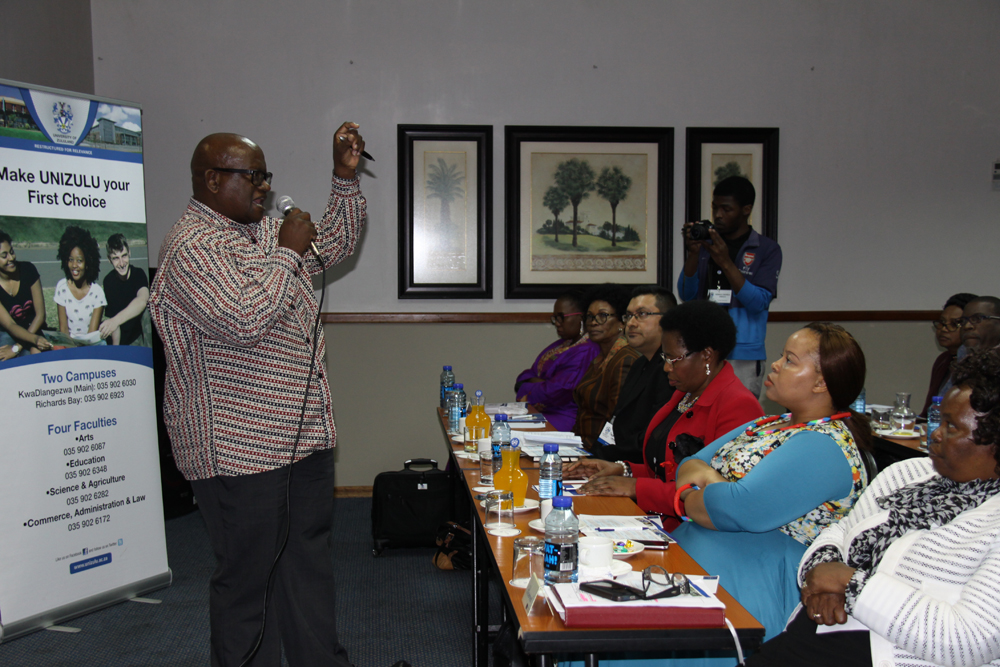UNIZULU Engages with School Educators

The University of Zululand (UNIZULU) recently invited high school educators and principals to its first Principals Seminar.
The aim of this Principal Seminar is to connect with schools as well as provide educators with adequate information regarding entry requirements, course outlines as well as other beneficial information for the prospective first year student.
Faculties as well as other stakeholders within the University engaged with the various principals by providing them with course requirement information and advice on suitable subjects that learners should consider. In this way, the correct information reaches the grade 12 learner who wishes to study at UNIZULU.
“This seminar is vital in establishing good relationships with the leaders of schools. It allows both parties (UNIZULU and principals) to identify the role that each has to play in order to equip the learner in making the best choice”, said Professor Thandi Nzama from the Arts Faculty.
Educators learnt that in order for prospective students to apply for admission to any undergraduate qualification, they first must apply via the Central Application Office (CAO) and must pay the required fee within the prescribed period. When choosing the subjects, learners must also remember not to exceed two official languages and must also achieve a National Senior Certificate (NSC) rating of three or higher.
“It’s imperative that learners pass a minimum of four 20 credits NSC subjects in order to qualify to their chosen programmes. Once application via CAO is received depending on the programme, applicants might need to undergo a selection interview or an aptitude test”, said Mr VW Maneli, Manager of Student Admissions. Maneli continued to stress that one of the reasons applicants are rejected is because of an outstanding official document that is required. “Prospective students must triple check that they have all the documentation needed. It should be stamped by an official of the law especially if it is a copy. These are usually the learners Identity Document (ID) and matric certificate”, he said.
Additionally, learners should keep track of their application process via CAO. Learners can check on multiple platforms such as SMS, email, online as well as an official letter sent to them with regards to their application.
During the seminar, there were major concerns raised regarding the alarmingly low standard of education curriculum status in KwaZulu-Natal and how this negatively impacted on the development of the student who enters an academic environment.
“Learners who are passing with an aggregate of 60 percent in high school find it difficult to cope with first year maths and science. We need to assess what is being taught in schools and how to align it with first year university level. Otherwise, students will continue to drop out of maths and science courses because they simply cannot cope”, said Prof Vivier from the Faculty of Science and Agriculture.
This growing pandemic is largely due to inadequate support given to teachers and inadequate material that does not coincide with the content taught in University.
“As UNIZULU, we have a responsibility to make a difference in the life of a learner by providing him with the best education. We have a writing centre in place to assist current students to sharpen their academic writing. We also are involved in community engagement activities through initiatives such as the annual winter schools programme. This is our way of assisting local school learners and educators”, said Prof M Hlongwane from the Faculty of Education.
Another major concern is the issue on finance with many learners coming from poor backgrounds. Fortunately, there are financial options for such learners in place such as scholarships and bursaries.
“Learners have various financial aid options such as SETA bursaries, district based bursaries which only select grade 12 learners from rural areas and sponsorship funding schemes. Each financial aid option has its own requirements which learners, family members and educators should take into serious account”, said Ms N Mbokazi from the University’s Financial Aid Bureau office.
The National Student Financial Aid Scheme (NSFAS) is the primary financial aid that a majority of full-time registered South African students can qualify for. This is a loan-based financial aid scheme.
At the end of the Principal Seminar, one resounding message was clear: in order to produce excellent learners, a strong positive partnership between universities such as UNIZULU and school educators must exist. In this way, learners will be fully prepared for higher education.
Quoting the late icon and statesman Nelson Mandela, the Prof D Iyer from the Faculty of Commerce, Administration and Law said, “Education is the most powerful weapon that can change the world. Let’s all take strides in implementing this ethos within the classroom to ensure we produce responsible, well behaved and intelligent students who will be able to change the world”.














Leave a Reply